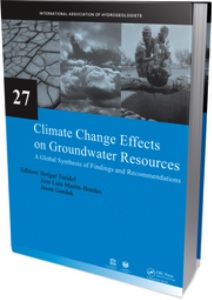Professor's groundwater research gains international attention
When Jason Gurdak says climate change is going underground, he means it literally.

Jason Gurdak is an internationally recognized groundwater expert.
Gurdak, assistant professor of geosciences, is co-editor of a new book by a United Nations-sponsored group of scientists that explores the effect of climate change on underground water sources, an issue that Gurdak says has been overlooked by many scientists and policymakers.
As precipitation becomes less frequent due to climate change, lake and reservoir levels will drop and people will increasingly turn to groundwater for agricultural, industrial and drinking water needs, he said.
"It is clear that groundwater will play a critical role in society's adaption to climate change," said Gurdak, who has studied the High Plains aquifer in the Midwest extensively.
Groundwater already accounts for nearly half of all drinking water worldwide, but recharges at a much slower rate than aboveground sources and in some cases is nonrenewable. As more people tap into groundwater, they may not realize that they are relying on an unsustainable resource.
"Once the water tables have been dropping a couple of feet every year, as they are in some places, it's kind of too late for water to recharge in a way that we can use," he said.
Gurdak was one of the principle editors of "Climate Change Effects on Groundwater Resources," a book released in December that is the result of a global groundwater initiative by the United Nations Educational, Scientific, and Cultural Organization (UNESCO).
Though few groundwater regulations and conservation measures are in place in much of the world, the scientists who contributed to the book hope to change that. The book contains policy recommendations that Gurdak is taking before international policymakers this week at the March 12-17 World Water Forum in Marseille, France.

The impacts of climate change on groundwater vary widely depending on the type of climate region. In temperate coastal regions like the Bay Area, saltwater intrusion is a major threat. When sea levels rise, saltwater could begin seeping into underground freshwater sources, tainting their use for drinking water and irrigation. Wetlands, a crucial regulator of groundwater quality and water levels, may also start to dry up.
Although groundwater is not the primary water source in the Bay Area -- water is piped in from Hetch Hetchy and other reservoirs -- groundwater is vital in the Central Valley and other parts of the state.
"In many ways, California is leading the way in developing solutions," Gurdak said. "Artificial recharge, managed storage and recovery projects and low impact development around the state will become more important for many local water systems to bank excess water in aquifers."
But Gurdak said that conservation starts with educating future generations about where their resources come from and how limited they may be.
"Day to day we don't see where our water comes from, we just turn on the tap and it's there and it's clean," he said. "But just like with a carbon footprint, you can calculate your water footprint."
-- Philip Riley